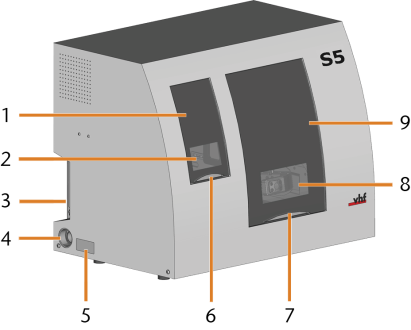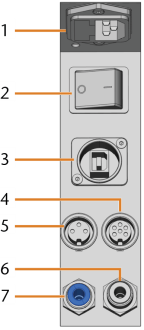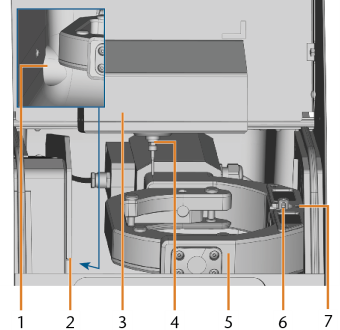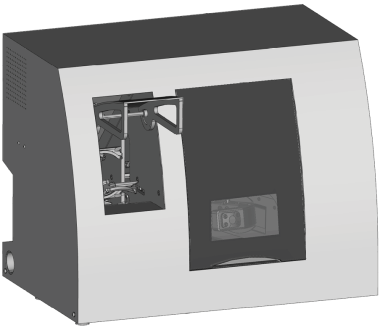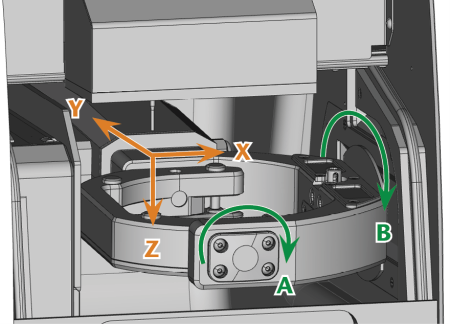Machine overview
With your S5 you can machine blanks of different materials to create high-quality objects for the dental sector. You can find a list of the materials which you can process with the machine in the manufacturing software![]() Term for the software package consisting of dentalcam and dentalcnc..
Term for the software package consisting of dentalcam and dentalcnc..
The blank changer![]() Machine component which stores multiple blanks in a magazine and which can automatically load them into the working chamber.. When using the search, use a blank changer or a blank magazine instead of the S5 allows you to process up to 8 jobs in succession without having to start each job manually.
Machine component which stores multiple blanks in a magazine and which can automatically load them into the working chamber.. When using the search, use a blank changer or a blank magazine instead of the S5 allows you to process up to 8 jobs in succession without having to start each job manually.
The machine is designed for wet and dry machining.
During dry machining, our anti-soiling concept reduces the soiling of sensitive machine parts.
Wet machining requires the optional vhf wet grinding module. The wet grinding module and the required cooling lubricant Tec Liquid Pro are available from customer service.
Front side of the machine
- Blank magazine
 Part of the blank changer in which you store the blanks for automatic loading. door
Part of the blank changer in which you store the blanks for automatic loading. door
- View window to the blank magazine
 Part of the blank changer in which you store the blanks for automatic loading.
Part of the blank changer in which you store the blanks for automatic loading.
- Connection panel and main power switch on the back
- Hose connection for the air extraction system
- Identification plate
- Recessed grip for opening the blank magazine
 Part of the blank changer in which you store the blanks for automatic loading. door
Part of the blank changer in which you store the blanks for automatic loading. door
- Recessed grip for opening the working chamber door
- View window to the working chamber
- Working chamber door
Connection panel
- Power connection including glass fuse T6,3A L250V
- Main power switch
- USB port
- Air extraction interface (6 pins, IEC 61076-2-106)
- Switching output for the optional external wet grinding module
- Cooling liquid connection for the optional external wet grinding module
- Pneumatic connection (6 mm push-in fitting)
Working chamber door
The working chamber door locks the working chamber and protects the user from injuries during operation.
You cannot open the door when the machine is switched off or while the axes are moving.
Working chamber
You can insert blanks and tools into the working chamber. This is where the blanks are machined.
- Outlet for the cooling liquid / air extraction opening
- Blank changer
 Machine component which stores multiple blanks in a magazine and which can automatically load them into the working chamber.. When using the search, use a blank changer or a blank magazine instead flap
Machine component which stores multiple blanks in a magazine and which can automatically load them into the working chamber.. When using the search, use a blank changer or a blank magazine instead flap - Ionizer
- Spindle
- Blank holder; Rotational axis A; Rotational axis B
- Measuring sensor with protective cage
- Tool magazine
Colors of the working chamber lighting
|
Color |
Status |
Working chamber door |
|---|---|---|
|
White |
The machine is ready for operation. |
unlocked |
|
Blue |
|
locked |
|
Red |
A machine malfunction has occured. |
locked |
Blank magazine
The blank magazine![]() Part of the blank changer in which you store the blanks for automatic loading. is the part of the blank changer
Part of the blank changer in which you store the blanks for automatic loading. is the part of the blank changer![]() Machine component which stores multiple blanks in a magazine and which can automatically load them into the working chamber.. When using the search, use a blank changer or a blank magazine instead where you equip the blanks that you want to machine. The blank changer
Machine component which stores multiple blanks in a magazine and which can automatically load them into the working chamber.. When using the search, use a blank changer or a blank magazine instead where you equip the blanks that you want to machine. The blank changer![]() Machine component which stores multiple blanks in a magazine and which can automatically load them into the working chamber.. When using the search, use a blank changer or a blank magazine instead automatically loads and unloads the blanks into and from the working chamber. The machine can be equipped with up to 8 blanks.
Machine component which stores multiple blanks in a magazine and which can automatically load them into the working chamber.. When using the search, use a blank changer or a blank magazine instead automatically loads and unloads the blanks into and from the working chamber. The machine can be equipped with up to 8 blanks.
The blank magazine![]() Part of the blank changer in which you store the blanks for automatic loading. door covers the blank magazine
Part of the blank changer in which you store the blanks for automatic loading. door covers the blank magazine![]() Part of the blank changer in which you store the blanks for automatic loading. and protects the user from injuries during operation. The blank changer
Part of the blank changer in which you store the blanks for automatic loading. and protects the user from injuries during operation. The blank changer![]() Machine component which stores multiple blanks in a magazine and which can automatically load them into the working chamber.. When using the search, use a blank changer or a blank magazine instead can only operate when the blank magazine
Machine component which stores multiple blanks in a magazine and which can automatically load them into the working chamber.. When using the search, use a blank changer or a blank magazine instead can only operate when the blank magazine![]() Part of the blank changer in which you store the blanks for automatic loading. door is closed. You can open and close the blank magazine
Part of the blank changer in which you store the blanks for automatic loading. door is closed. You can open and close the blank magazine![]() Part of the blank changer in which you store the blanks for automatic loading. door manually.
Part of the blank changer in which you store the blanks for automatic loading. door manually.
CAM computer
To operate the machine, you must use a computer running Windows® (“CAM computer![]() The computer that is connected to your machine and which runs dentalcam and dentalcnc.”) and specially designed software (“manufacturing software
The computer that is connected to your machine and which runs dentalcam and dentalcnc.”) and specially designed software (“manufacturing software![]() Term for the software package consisting of dentalcam and dentalcnc.”). The manufacturing software
Term for the software package consisting of dentalcam and dentalcnc.”). The manufacturing software![]() Term for the software package consisting of dentalcam and dentalcnc. consists of the following components:
Term for the software package consisting of dentalcam and dentalcnc. consists of the following components:
- dentalcamA CAM application for creating and calculating virtual blanks (“jobs”)
- dentalcncA CNC application for machining jobs and for maintaining the machine.
To create and design the dental objects you also need a CAD application (sold separately by specialist dealers).
Identification plate and serial number
The identification plate of the machine contains identifying information such as the serial number. You can find the identification plate and machine serial number at the following location: Front side of the machine
Axes
This machine has
